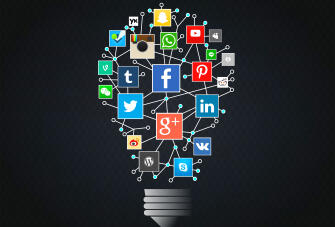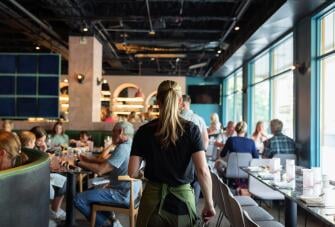How to Improve Customer Experience in the Hospitality Industry
Let's talk about obsession. Not the dramatic kind, we mean the good kind. The kind where you walk into your local café and the barista already knows your name, your coffee order, and that you’ve had a rough morning.
Now, you’d think that kind of guest experience would be standard in hospitality but, according to Forrester, 85% of businesses aren’t actually customer-obsessed even though most of them say they are.
Some places say all the right things like “Our guests are everything,” but then forget your name, get your order wrong, or leave you hanging for ten minutes when all you wanted was the Wi-Fi password. Not ideal, and not exactly five-star review material.
Then you’ve got the businesses that walk the walk. The ones who really get it. They pay attention. They personalize every touchpoint. And as a result, they build serious customer loyalty and keep people coming back.
Let's find out how to improve customer experience in hospitality industry so you can be the latter.
Why customer experience is the foundation of hospitality
Before we get into the practical steps of helping you learn how to improve customer service in hospitality industry, let's first zoom out and look into why that's important.
The link between experience and loyalty
The hospitality industry runs on repeat business, word of mouth, and reputation. Those all come down to the positive guest experience and 57% of customers will switch to a competitor after just a single bad experience!
But here’s the upside. When you get it right? The payoff’s huge.
How a strong guest experience impacts revenue and retention Memorable experiences lead to loyal customers, which directly impacts revenue.
Companies that focus on customer experience see up to an 80% increase in revenue which means if you haven’t made customer experience hospitality your focus yet, including a hospitality loyalty program... now’s the time.
Customer loyalty in the hospitality industry doesn’t come from points systems or promo emails alone. It comes from moments and how your guests feel.
A positive guest experience leads to repeat business, positive reviews, and word-of-mouth referrals, which are critical for a hotel's long-term success. In fact, 90% have stated that they’ve made customer experience their primary focus.
What drives customer loyalty in the hospitality industry?
So, what actually makes a guest come back? Is it the loyalty card with the very confusing stamp system? The 10% off voucher they forget to use? Or is it something deeper?
Spoiler: It’s deeper.
Emotional connections and brand consistency
First up: emotional connection and the personal touch.
It’s not about big gestures, it’s about the little things that make a big impact.
Things like remembering a guest’s name, noticing when they’ve had a long day, or offering a small upgrade. These moments make guests feel valued and are a part of exceptional customer service . They create a positive guest experience -the kind that turns first-timers into loyal customers.
But that feeling only sticks if it’s consistent. Across every location and every interaction. That’s where brand consistency steps in. It helps shape the entire customer journey, so guests know what to expect -and they keep coming back because they trust you’ll deliver.
Speed, convenience, and attention to detail
People want things fast, easy, and done right.
72% of customers want immediate service. That means cutting wait times, reducing friction, and training staff to get the small details spot-on.
In the hospitality sector, it can look like this:
- Room service that arrives on time.
- A welcoming atmosphere the moment you step through the door.
- Smart technology that remembers guest preferences and helps enhance the guest experience.
Examples from restaurants, cafés, and gyms
Let’s imagine how this plays out in different spots around the hospitality industry:
- At a restaurant, imagine a server who knows that Sarah always orders the vegan pasta and prefers her wine chilled just right. They check in halfway through to see if everything’s perfect. That kind of attention makes Sarah feel noticed and valued, building customer loyalty.
- At a local café, picture Jake, who swings by every morning. The barista knows his usual: double espresso, no sugar, and greets him with a smile. Sometimes they even have his coffee ready before he gets to the counter.
- At a gym, think of Lisa. She gets a text reminder about her favorite yoga class, plus a quick message congratulating her on hitting a new PB. That creates a memorable guest experience that motivates Lisa to stay loyal.
These little moments add up. They show how you can meet guest needs and guest expectations in simple but meaningful ways - and why they matter in creating long-term loyalty in the hospitality sector.
Personalization: the secret to repeat visits
Everyone loves feeling special. In fact, 88% of shoppers are more likely to keep buying from a company that offers a personalized experience, that number jumps even higher for Gen Z (96%) and millennials (97%). The same idea applies in hospitality. Personalization has evolved from being a luxury, to an essential standard in this industry and here's how you can do it:
Using preferences to deliver memorable service
In the hospitality world, knowing your guest’s likes and dislikes is important.
- Collect customer feedback regularly to understand what guests want and expect.
- Use smart technology like a hospitality POS system to track and remember preferences like favorite drinks, seating choices, or room service orders.
- Train staff to recognize and use this information to create a personal touch that feels genuine, not forced.
When guests feel the service is tailored just for them, it turns routine visits into positive guest experiences that encourage repeat business and build customer loyalty.
Dynamic guest journeys across hospitality segments
Every venue in the hospitality sector operates differently, so personalization needs to be flexible and dynamic.
- Hotels might focus on customizing room service menus, spa treatments, or check-in preferences.
- Restaurants and cafés can tailor menu suggestions, seating, or special offers based on past visits.
- Gyms may track workout preferences and send personalized class recommendations or progress updates.
By adapting personalization to fit each part of the hospitality customer journey, businesses meet guest expectations and make every interaction count.
How to tailor offers and experiences using tech
Technology plays a huge role in delivering personalized experiences at scale in the hospitality industry.
- Use POS systems and CRM software to collect real-time data on guest preferences, purchase history, and behaviour throughout the entire visit.
- Analyze this data to spot patterns, like favourite menu items, peak visit times, or preferred room types, so you can anticipate guest needs.
- Implement smart tools that trigger personalized messages, such as welcoming guests by name on arrival screens or offering tailored recommendations during their visit.
- Use mobile apps or digital kiosks to let guests customize their orders or services, giving them more control over their experience.
Designing effective hospitality loyalty programs
It’s no secret that keeping existing customers is way more cost-effective than chasing new ones. In fact, it costs 5 to 10 times more to acquire new customers than to retain existing ones. Plus, loyal customers usually spend more and are easier to serve. So let's learn how to design the best loyalty schemes.
What makes a loyalty program work?
The best loyalty programs all have a few things in common that actually make people want to join:
- Simple and clear structure: Easy to understand and use, so guests don’t get confused or frustrated.
- Valuable rewards: Incentives that guests actually want.
- Seamless integration: Works smoothly across the entire hospitality customer journey, from online bookings to in-person visits and even room service.
- Personalization: Tailors rewards and communication based on individual preferences and past behaviour to enhance the hospitality guest experience.
- Real-time tracking and updates: Guests can easily check their points and rewards status, keeping them engaged and motivated.
- Ongoing communication: Keeps guests informed about new offers, program updates, and exclusive deals without overwhelming them.
Comparing loyalty models for gyms vs. restaurants
Depending on what business you run, your loyalty program is going to look unique to you. Gyms and restaurants, for instance, have completely different approachs to loyalty:
Gyms
At gyms, loyalty programs are all about motivation and progress. Members want to feel like they’re moving forward with their fitness goals, and that they belong to a supportive community.
So, gym loyalty programs often reward their customers with things like:
- Free or discounted personal training sessions
- Access to exclusive classes or workshops
- Discounts on fitness gear or supplements
- Recognition for hitting milestones or consistent attendance
Restaurants
Restaurant loyalty programs work differently because dining is more about the experience and emotional connection. Guests want to feel valued and appreciated every time they visit. Rewards typically include:
- Discounts on meals or drinks
- Early access to new menus or special events
- Priority seating or reservations
- Surprise perks like complimentary desserts or birthday treats
Mistakes to avoid when rolling out a program
There are some classic traps that can trip up even the best intentions. Avoid these to keep your guests happy and your program effective:
- Making it complicated: If your loyalty program is hard to understand or use, people won’t bother. Keep it simple. Have clear rules, easy sign-up, and straightforward rewards. Confusing programs kill customer satisfaction fast.
- Ignoring guest feedback: You have to listen to your customers. If they say the rewards aren’t appealing or the process is clunky, adjust.
- Forgetting personalization: A generic “one size fits all” approach doesn’t work. Your program should reflect what your guests actually want, their preferences, habits, and guest needs. Personal touches make a huge difference in customer loyalty.
- Not promoting it properly: Even the best program won’t work if no one knows about it. Make sure staff talk it up, and use your tech channels to spread the word.
Simply superior POS software
Our point of sale (POS) software is built for growing businesses. Fulfill all your point of sale needs and transform your business with a quality point of sale system from Epos Now.
Gathering and using customer feedback
Collecting feedback from guests is crucial if you want to improve customer experience in the hospitality industry. But nobody wants to fill out a 20-question survey after a long day! Here's how to do it so you don't feel like you're annoying your valued customers:
Low-friction ways to collect guest feedback
Make feedback quick and painless:
- Use simple, one-question surveys sent via text or email right after the visit.
- Ask customers to leave reviews on popular review platforms. Strong online reviews and positive reputation are built from consistent guest satisfaction and memorable experiences.
- Set up tablets or QR codes at the venue for instant ratings.
- Encourage casual, in-person chats with staff about how the experience was.
Turning feedback into actionable service improvements
Getting feedback is just step one, the next step is to act upon it. Once you’ve started noticing patterns and repeat comments, you can start to fix using the following steps:
- Train your team to fix common issues.
- Adjust processes or menus based on what customers say.
- Use technology to track improvements and spot new problems early. This way, feedback directly fuels better hospitality guest experience and keeps guests coming back.
Building a feedback loop into the customer journey
Feedback shouldn’t be a one-off thing. Embed it into every stage of the hospitality customer journey so it becomes natural:
- Ask for quick feedback right after key moments. Like if you own a B&B and are focussing on hotel customer experience, ask at checkout.
- Let customers know their opinions matter by sharing updates on changes you’ve made.
- Keep the conversation open - show you’re always listening and ready to improve. This continuous loop creates a culture of care and sharpens your ability to deliver exceptional customer service.
Using technology to enhance the hospitality customer experience
The right tools can totally transform how you deliver exceptional customer experience in the hospitality industry, helping you keep up with guest expectations and build real customer loyalty.
How POS data supports loyalty and personalization
In the hospitality industry, a hotel POS system does more than handle payments, it collects valuable guest data that helps personalize the hotel customer experience. By tracking guest preferences and past orders, hotels can tailor services and offers that make guests feel truly valued.
Similarly, a restaurant POS captures detailed info about dining habits, favorite dishes, and visit frequency. This data allows restaurants to create targeted promotions and personalized
recommendations, boosting customer loyalty in the hospitality industry and delivering a better guest experience.
For cafés, a cafe POS system helps speed up service while remembering regular customers’ favorite orders. Using POS data like this enhances customer satisfaction by meeting and exceeding guest expectations throughout the entire customer journey.
Automating rewards and recommendations with smart tools
Imagine this: your POS system knows what your guests like. Now, with automation, it can send them rewards or offers without you having to lift a finger. So instead of manually tracking who’s due a free coffee or a discount, the system just does it for you.
Role of CRM and analytics in hospitality settings
CRM and analytics might sound complicated, but they’re basically just smart ways to keep track of your guests’ preferences and feedback. When you combine that with your POS data, you get a clear picture of what your customers want.
This means you can spot what’s working, what’s not, and fix things fast. You also get to know your guests better, so you can give them offers or experiences that actually matter to them. And that’s how you build loyalty and make your guest experience really stand out.
Customer experience tips for different hospitality venues
Not every hospitality spot is the same. What works for a restaurant might flop in a gym or café. So here’s the scoop on how to nail customer experience for your venue.
Restaurants: staff engagement, timely service, reward offers
It’s all about the people. Friendly, engaged staff make a huge difference. Quick, timely service keeps guests happy (no one likes waiting). And throw in some reward offers - maybe a free dessert or a discount - to make customers feel appreciated and want to come back.
Gyms: member progress, consistency, surprise incentives
People are there to crush fitness goals so focus on helping members see their progress and stay motivated. Keep things consistent, like regular classes or check-ins. Don’t forget to surprise them sometimes with little incentives, like a free protein shake, smoothie or a guest pass.
Cafés: recognizing regulars, speed, mobile ordering
Speed is king here. Regulars want to be recognized. Maybe by name or their usual order. Mobile ordering is also great for quick service, especially when people are in a rush. Make it easy and personal, and you’ll win the customer experience game.
Final thoughts: make loyalty a natural outcome of great experiences
That’s it from us!
We’ve shared all our best tips and tricks for how to improve customer experience in the hospitality industry.
Now it’s your turn to take these ideas, mix in your own style, and make every guest feel like the VIP they truly are.
Liked this blog? Check out our other hospitality resources like our merchant services guide or our operations management blog.
FAQs
- What drives customer loyalty in the hospitality industry?
-
Customer loyalty in the hospitality industry is driven by consistently delivering exceptional guest experiences that meet or exceed expectations.
- How do loyalty programs differ between a restaurant and a gym?
-
Loyalty programs differ between restaurants and gyms because restaurants focus on rewarding frequent visits and dining preferences, while gyms emphasize progress tracking and motivation-based incentives. Similarly if you have a bar POS system, you’ll want to think about schemes like offering points for every drink purchased, exclusive access to tasting events, or freebies after a set number of visits.
- What role does personalization play in improving repeat visits?
-
Personalization improves repeat visits by making guests feel valued through tailored offers, communications, and services based on their preferences.
- What are easy ways to gather customer feedback and use it effectively?
-
Easy ways to gather customer feedback include using smart technology like quick surveys, comment cards, and digital review platforms, then acting on the insights to enhance service.
- Can a POS system help manage loyalty rewards or track customer behavior?
-
Yes, tablet POS systems and other technology in the hospitality industry can effectively manage loyalty rewards and track customer behavior to help tailor offers and improve guest engagement.
- How can technology improve customer service in hospitality venues?
-
Technology in the hospitality industry improves customer service in hospitality venues by streamlining operations, enabling faster responses, and delivering personalized guest interactions.
- Contactless check-in and check-out options have become increasingly popular due to safety concerns.
- Mobile apps allow guests to clarify details and make requests while offering special deals.
- Chatbots have become common in the hotel industry to facilitate quick and private communication with guests.
- What’s the connection between guest experience and customer retention?
-
Positive guest experiences directly increase customer retention by fostering trust, satisfaction, and emotional connections with the brand.
- How can hospitality businesses create a more personalized customer journey?
-
Hospitality businesses create a more personalized customer journey by collecting and using guest data to tailor interactions, offers, and services at every touchpoint.




